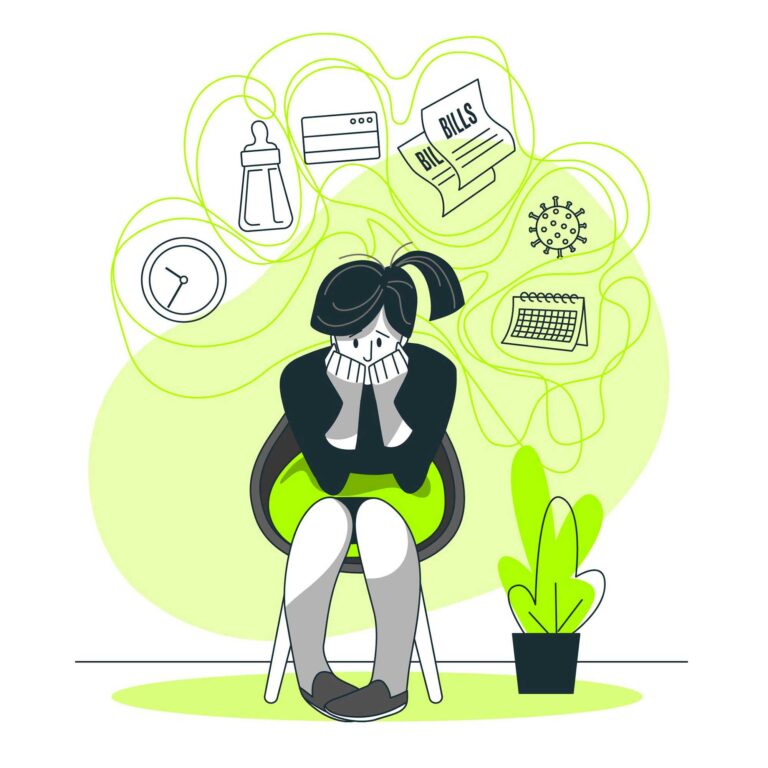
Anxiety disorders encompass a spectrum of mental health challenges, impacting millions worldwide. This article endeavors to explore these intricate mental health issues, aiming to provide insights, guidance, and support.
Introduction to Anxiety Disorders
Understanding Anxiety and Prevalence Anxiety, a natural human response to stress, can transform into a disorder. It affects a substantial portion of the global population, manifesting in various forms and intensities.
Overview of Different Anxiety Disorders The broad array of anxiety disorders includes Generalized Anxiety Disorder (GAD), Panic Disorder, Social Anxiety, and Obsessive-Compulsive Disorder (OCD). Each exhibits distinct characteristics and symptoms.
Symptoms and Types of Anxiety Disorders
General Symptoms of Anxiety Disorders The symptoms vary but commonly include persistent worry, physiological changes, and alterations in behavior and mood.
Specific Types – OCD, Panic Disorder, Social Anxiety, etc. Each specific disorder brings its unique set of symptoms, often disrupting daily life and relationships.
Diagnosis and Treatment of Anxiety Disorders
Diagnosis Process for Anxiety Disorders Understanding how professionals assess and evaluate symptoms to diagnose anxiety disorders is crucial.
Diverse Treatment Approaches for Anxiety Therapies like Cognitive Behavioral Therapy (CBT), medication, and self-care strategies offer varied pathways to manage and overcome anxiety disorders.
Living with Anxiety Disorders
Coping Strategies and Lifestyle Changes Exploring effective ways to cope with anxiety and adapt lifestyle for symptom management and overall well-being.
Support Systems and Seeking Help Emphasizing the importance of building a support network and seeking professional guidance for individuals facing anxiety disorders.
Exploring Alternative Therapies
Benefits of Meditation and Mindfulness Detailing how mindfulness practices and meditation techniques can aid in alleviating anxiety symptoms.
Acupressure, CBT, and Holistic Approaches Exploring alternative therapies like acupressure and holistic practices in anxiety management and treatment.
Anxiety and Mental Health
Relationship Between Anxiety and Depression Unpacking the intricate link between anxiety and depression, emphasizing their co-occurrence.
Impact of Anxiety on Mental Wellness Highlighting the detrimental effects of anxiety disorders on mental well-being and overall health.

Overcoming Stigma and Seeking Support
Addressing Societal Stigmas Around Anxiety Examining societal stigmas surrounding mental health and the need to foster open conversations about anxiety disorders.
Encouraging Support-Seeking Behavior Advocating for a culture that encourages and supports individuals seeking professional help for anxiety disorders.
In a nut shell...
In conclusion, understanding and navigating anxiety disorders is essential for individuals’ mental wellness. With resilience, varied support systems, and a comprehensive understanding of treatment approaches, managing anxiety becomes a more attainable goal. The journey from anxiety disorders to mental wellness is multifaceted. With a better understanding of symptoms, diagnosis, treatment, coping mechanisms, and strong support systems, one can pave the way to resilience and recovery.
FAQs
Q: What are the General Symptoms of Anxiety Disorders? Anxiety disorders often display various symptoms, such as persistent worry, physiological changes, and alterations in behavior and mood. These symptoms may significantly disrupt daily life and personal relationships.
Q: How are Anxiety Disorders Diagnosed? Diagnosing anxiety disorders involves professional assessment and evaluation of symptoms. Professionals typically refer to diagnostic manuals, using specific criteria to accurately diagnose an anxiety disorder.
Q: What Treatment Options are Available for Anxiety Disorders? Several treatment options exist for managing anxiety disorders, including Cognitive Behavioral Therapy (CBT), medication, and personalized self-care strategies. The choice of treatment depends on the individual’s condition and its severity.
Q: How Does Anxiety Relate to Depression? Anxiety and depression often co-occur, sharing symptoms and contributing to a complex relationship affecting mental health. While they are distinct conditions, they can interact and influence each other, exacerbating overall symptoms.
Q: Why is Building a Support Network Important for Anxiety Disorder Management? Building a support network is crucial for individuals with anxiety disorders, providing emotional aid, guidance, and validation. It significantly contributes to managing and recovering from anxiety disorders, offering a sense of community and understanding.
|
